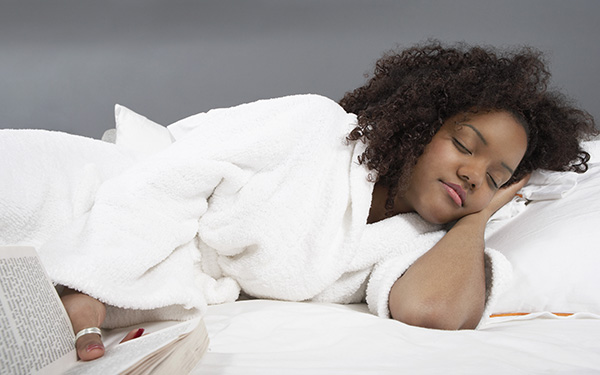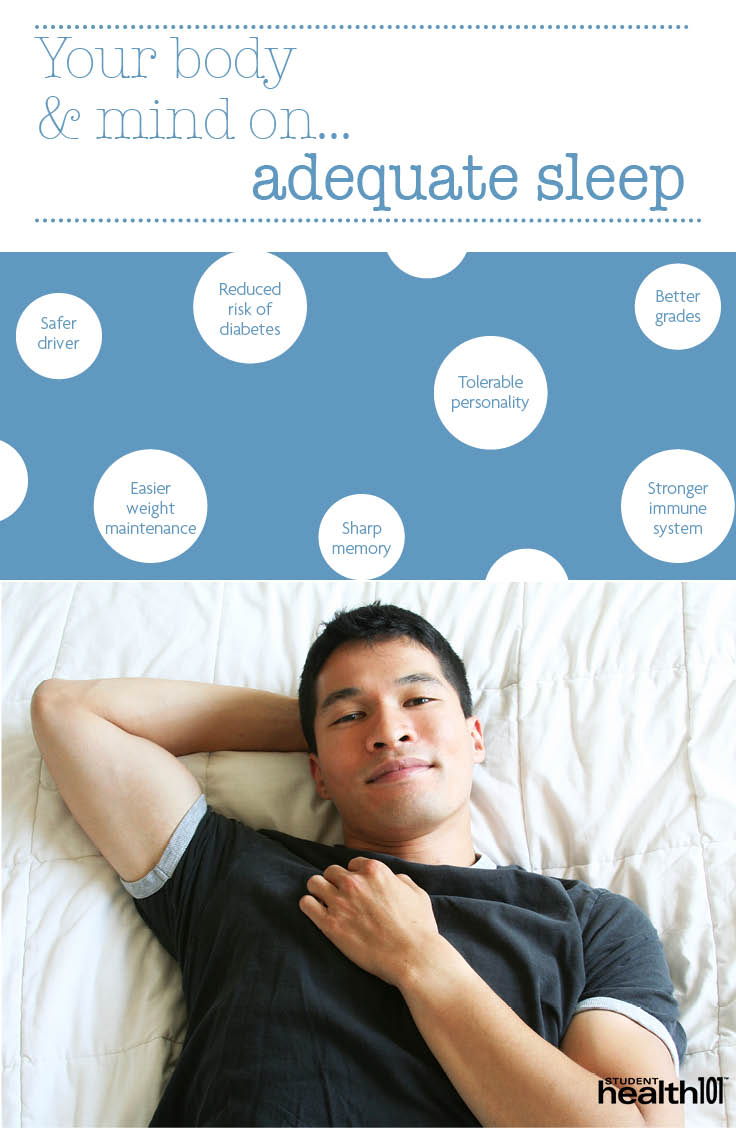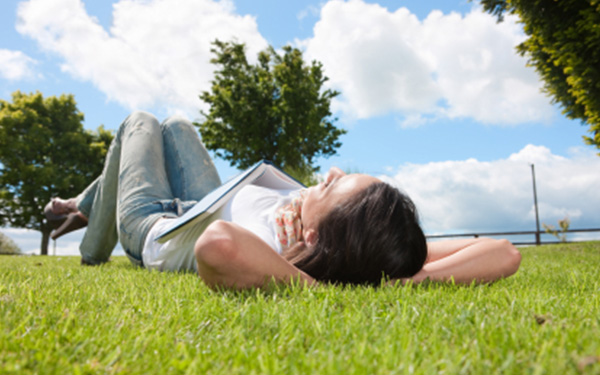Sleep study
Top 10 tips for better nights

The benefits of sleep have been unarguably established by science. Restful nights are strongly associated with happiness, healthy weight maintenance, reduced risk of chronic disease, and having a tolerable personality.
Students present like budding narcoleptics, says William C. Dement, a leading sleep expert, in his book The Promise of Sleep (2000). Still, that doesn’t stop you from knowing what you should be doing to get a better night’s sleep. In a survey for Student Health 101, 450 students ranked 10 of the most common sleep strategies from least to most helpful. Then you told us what we’d missed.
How would you rank these tips?
studentvoice

#10 Medications & supplements
More than a third of respondents ranked prescription medications the least useful of our 10 options. That might be because zolpidem, the most commonly prescribed sleep drug, is associated with dangerous behaviors like sleep-driving and that ridiculous email I sent at 4 a.m. Science has yet to bring us a medication with the side effect of sleep-writing an awesome statistics paper.
You also said “no” to over-the-counter sleep aids, like melatonin, valerian, and antihistamines. Their safety and effectiveness have not been well established. Melatonin seems to have modest benefits and antihistamines can help temporarily. Melatonin is somewhat protective against nuclear radiation, so there’s that.
#9 Sleep apps
Our students don’t use them much, but many people swear by sleep management apps.
Sleep Cycle tracks your sleep habits, helps you identify unhelpful behaviors, and wakes you up gently.
Sleep As Android lets you know when you’re not getting enough zzzs and what you’re muttering in your sleep (but do you want to find out?).
Apps make your phone your bedmate, which might be problematic for those of us with compulsive technology habits.
#8 The beautiful day you just had
Less than 5 percent of you said a beautiful day is what best helps you sleep. Three times as many said it was your least helpful sleep strategy.
Is this because students don’t have beautiful days? “Bedtime stress and worries were the main predictors of sleep quality,” concluded a study in Sleep Medicine (2012). Charlotte Brontë put it more eloquently: “A ruffled mind makes a restless pillow.”
If your angst is keeping you up, try consigning it to paper: Keep a pad and pen by your bed.
#7 Conscious relaxation or breathing exercises
Relaxation exercises can ease physical tension and mental activity and help us fall asleep more quickly.
Techniques include progressive muscle relaxation (tensing and relaxing), consciously relaxing different body parts, and visualization.
Just over 1 in 10 of you ranked this in your top 3 of our sleep solutions. Free guided relaxation exercises are available online.
#6 No computer use before (or in) bed
Electronic gadgetry is the vicious enemy of sleep. The blue wavelength light emitted by our tablets, laptops, and phones suppresses melatonin, the hormone that regulates sleep cycles.
Many sleep disorders are probably related to evening or nighttime light exposure, sleep experts say.
A third of our respondents ranked avoiding electronic screens before bed in their top 3 of our 10 solutions.
#5 No alcohol and/or caffeine in the evening
“Take coffee then—this juice divine shall banish sleep,” wrote the French poet Maumenet long ago. No argument there. Caffeine lasts in your system for eight hours—and some of the most common coffee brands and energy drinks are very high in it.
There seems to be some confusion about alcohol. Some respondents commented that alcohol helps them fall asleep. Maybe—but it disrupts the later stages of sleep and leaves us groggy the next day. [The legal minimum age for consuming alcohol is 21.]
In a 2007 study, the combination of not enough sleep (four hours) and one or two drinks severely impaired students’ performance on a driving simulator: 35 percent had accidents.
More than a quarter of respondents ranked avoiding caffeine and/or alcohol before bed among the top 3 of our 10 sleep strategies.
For a video on how alcohol affects sleep, CLICK HERE.#4 Dark and/or cool room at night
The lightbulb has many fine qualities, but wreaks havoc on our sleep. Having the lights on after dusk suppresses melatonin and disrupts sleep cycles. It might also raise blood pressure and the risk of diabetes, says a 2010 study.
Air temperature matters too. A room that’s too hot or too cold can interfere with your body temperature cycle through the night. The right room temperature varies: Try 65°F, and be ready to adjust it up or down. Thirty-seven percent of our student respondents put this in their top three of our sleep strategies.
#3 Exercise Regularly
Physical activity helps us sleep—as confirmed yet again by the Sleep in America poll from the National Sleep Foundation. Even light exercise helps.
And although we’ve traditionally been advised not to work out in the evening, evidence from that poll suggests the timing of our workouts might not matter. More than 4 in 10 students who took our survey ranked this in the top three of our strategies.
#2 A super-comfortable bed
The Princess and the Pea, the fairy tale by Hans Christian Andersen, taught us that even minor physical discomforts can be a fearsome impediment to sleep.
While it’s hard to buy the princess’s story that the pea left her “black and blue all over,” the general point holds: We sleep better in a comfortable bed than on broken glass and porcupine spines.
More than half of our student respondents ranked physical comfort in their top three sleep solutions. The poet Rupert Brooke wrote of “the cool kindliness of sheets, that soon/Smooth away trouble” (The Great Lover).
#1 Get up at a consistent time each day
“The single most important thing a person can do to set the body’s clock is to wake up at the same time every morning,” says Dr. Stephen Amira of the Division of Sleep Medicine at Harvard Medical School. For his video on maintaining a consistent wake time, CLICK HERE.
Fifty-eight percent of our survey respondents ranked this in their top 3 of our 10 sleep strategies. As many students pointed out, the key is a consistent sleep schedule in general: going to bed and getting up at the same times each day. The painful piece is matching weekend and weekday wake-ups. Weekend disruption is likely to keep you groggy through the week.
Other popular sleep strategies
Recommended by students
- Sensible consistent bedtime
- Having an established bedtime routine
- Reading
- Journaling
- An orgasm (or several)
- Soft music or ambient noise
- Getting coursework done early
- Prayer or meditation
- Active days
- Aromatherapy
- Hot bath or shower
- Pillow talk
- Cuddling with pets, children, and/or partners
- Herbal tea
Recommended by our experts
- Strategic afternoon naps of 20–30 minutes
- Diaphragmatic breathing combined with neck and shoulder massages
studentvoice








